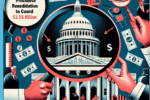Beijing, China – In a move to address slowing economic growth, China’s central bank announced a cut in the reserve requirement ratio by 50 basis points. This decision comes amidst concerns over the impact of the ongoing trade war with the United States and a global economic slowdown. The People’s Bank of China (PBOC) believes that reducing the reserve requirement ratio will inject liquidity into the market and stimulate economic activity.
The rate cut by the central bank is part of a series of efforts to support the Chinese economy as it faces various challenges. In addition to the reserve requirement ratio cut, the PBOC also announced a reduction in the 14-day reverse repo rate. These measures aim to ease financial pressure on businesses and encourage lending to boost domestic demand.
Analysts view these moves as crucial steps in addressing China’s economic woes, which have ripple effects on the global economy. The country’s growth slowdown has raised concerns among investors and policymakers worldwide. By taking proactive measures to inject liquidity and lower rates, China hopes to stabilize its economy and mitigate the impact of external factors.
The PBOC’s decision to cut the reserve requirement ratio and adjust rates reflects the government’s commitment to supporting economic growth. While these actions may provide temporary relief, experts warn that more sustainable policies are needed to address deeper structural issues in the Chinese economy. As trade tensions persist and global uncertainties linger, China faces a challenging road ahead in maintaining stability and sustainable growth.
Overall, the central bank’s moves to inject cash and adjust rates signal a proactive approach to managing economic challenges. Whether these measures will be effective in boosting growth and shielding the economy from further slowdown remains to be seen. With ongoing uncertainties in the global economy, China’s ability to navigate these turbulent times will be closely watched by investors and policymakers alike.










